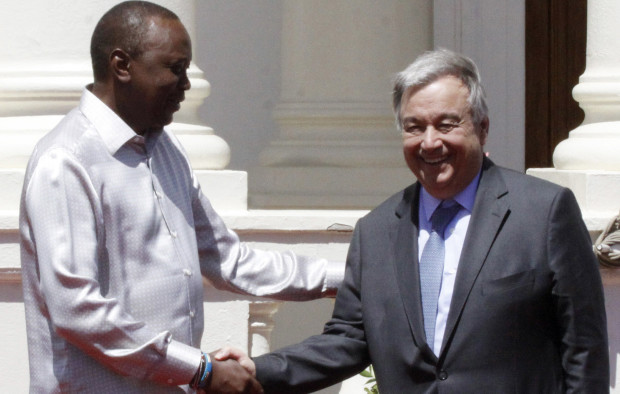
UN secretary general Antonio Guterres, right, shakes hands with Kenyan President Uhuru Kenyatta (AP Photo/Khalil Senosi)
NAIROBI, Kenya — Kenya’s president on Friday ordered the military to deploy to the volatile counties of Baringo and Laikipia in the Rift Valley to calm deadly violence fueled by a drought that affects roughly half the country.
President Uhuru Kenyatta announced he has authorized the immediate deployment of the Kenya Defense Forces to support police operations there.
“The deployment will further assist in disarmament and surrender of illegally held arms,” Kenyatta said.
At least 21 people have died in fighting between herders the Illchamus Pokot and Tugen in Baringo county since early February. Thirteen people were killed this week. And in Laikipia county, a British farmer was killed this month by herders invading ranches in search of pasture and water.
The military has been accused of human rights abuses, including torture and executions, in a number of domestic security operations. However, the police force has suffered the deadliest attacks in its history at the hands of the pastoralists.
At least 42 police officers were killed in November 2012 attempting to pursue herders who had stolen cattle from a rival community.
In November 2014, 21 police officers were killed pursuing the Pokot herders in Kapedo at the border of Turkana and Baringo counties.
Livestock-keeping nomadic tribes in Kenya’s north routinely engage in traditional cattle raids, which experts say have become more deadly because the tribes have switched from using spears and arrows to guns.
Britain’s foreign secretary, Boris Johnson, welcomed the decision to deploy troops to Laikipia, which has other British farmers affected by the land invasions. Johnson was in Kenya as part of a regional visit that also stopped in Uganda, Ethiopia and Somalia.
Kenya has declared a national disaster because of the drought that affects about half of the counties in this East African nation.
Johnson said Britain will give Kenya 4 million pounds ($4.9 million) to mitigate the effects of the drought.